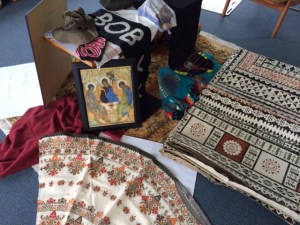Thursday, July 14, 2016
spirituality of eating: a lectio vocatio
I led a two day retreat for Wellington Ministers this week. The brief was fairly broad: to speak on something they’d not heard from me before. I decided to focus on “Give us this day our daily bread” and explore the spirituality of eating and the implications for ministry and mission.
Each session involved a five step cycle, which I called “lectio vocatio” – listening to God and each other – amid a shared vocation as ministers.
- Stories: reflective questions that invited story sharing
- Bible stories – read firstly for ordinary eating
- Bible stories – read secondly for theological purposes
- Ministry stories
- Application: Given the spirituality of “eating” in this Biblical story, what are the implications for ministry and mission?
I was rifting off lumia domestica, an art exhibition by Willie Williams, and how he takes ordinary things (culled from Oxfam shops across the world), and makes reflective, beautiful things. So in the ordinary of eating, there is beauty, which makes us go “wow.”
A first session revolved around Abraham’s hospitality in Genesis 18, to consider call
- Where are the places in which you have met strangers?
- What are the practices of hospitality you have experienced?
People had been invited to bring some cloth meaningful to them. These were laid on the table, as a way of making ourselves present in the circle of God’s love (in which our call to ministry begins). The diversity and colour was a rich reminder of particularity and uniqueness in ministry.
A second session focused on the widow of Zarepath in 1 Kings 17, to consider justice, community development and climate change
- Who are the “widows” in our community?
- What are their sticks and flour?
People had been invited to bring a tin can. We reflected on where the “daily bread” we eat comes from and what we knew about the production and people. This became intercession, as we placed our tin cans prayerfully.
A third session focused on Rahab in Joshua 2, to consider formation in mission and our willingness to work with what God is doing in unexpected places
- Where have you experienced shelter (food and a roof) in the lands of another?
- When have you unexpectedly heard affirmations of faith?
In ending, we cleared the table. As each person reclaimed their cloth and tin can, they shared an action they would like to engage, as a result of engaging together. The table was emptying, yet there was a renewed intentionality toward our ordinary tables of mission and ministry to which we were returning, grounded in a depth of contemplating (lectio) our vocations in ministry together.
I very much enjoy this type of teaching. The theme provided a different way to reflect on ministry and mission. The movement between silence, Scripture, story and discussion felt empowering, yet provocative. The chance to build something over a number of days opened up every deeper layers of conversation.
Key books in my preparation were: John Koenig, Soul Banquets: How Meals Become Mission in the Local Congregation and Rebecca Huntley, Eating Between the Lines
and Anne Richards, Sense Making Faith: Body, Spirit, Journey
.
No Comments
No comments yet.
RSS feed for comments on this post.
Sorry, the comment form is closed at this time.




















